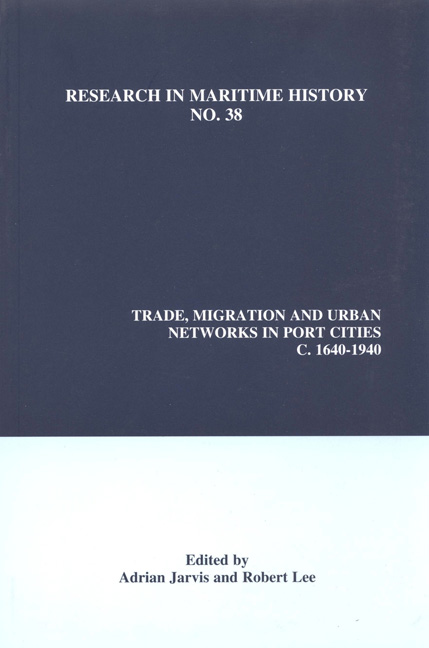Book contents
- Frontmatter
- Table of Contents
- Contributors' Notes
- “Trade, Migration and Urban Networks, c. 1640-1940: An Introduction”
- “Portuguese Jews in Amsterdam: An Insight on Entrepreneurial Behaviour in the Dutch Republic”
- “Contrasting Merchant Communities in the Early Eighteenth Century: Stockholm, Calabar and Charleston”
- “Integration of Immigrant Merchants in Trondheim in the Seventeenth and Eighteenth Centuries
- “In the Eye of the Storm: The Influence of Maritime and Trade Networks on the Development of Ostend and Vice Versa during the Eighteenth Century”
- “Exploiting International Webs of Relations: Immigrants and the Reopening of the Harbour of Antwerp on the Eve of the Nineteenth Century”
- “Migrants, Merchants and Philanthropists: Hierarchies in Nineteenth-Century Greek Ports”
- “Port Cities, Diaspora Communities and Emerging Nationalism in the Ottoman Empire: Balkan Merchants in Odessa and Their Network in the Early Nineteenth Century”
- “Combining Business and Pleasure? Cotton Brokers in the Liverpool Business Community in the Late Nineteenth Century”
“Integration of Immigrant Merchants in Trondheim in the Seventeenth and Eighteenth Centuries
- Frontmatter
- Table of Contents
- Contributors' Notes
- “Trade, Migration and Urban Networks, c. 1640-1940: An Introduction”
- “Portuguese Jews in Amsterdam: An Insight on Entrepreneurial Behaviour in the Dutch Republic”
- “Contrasting Merchant Communities in the Early Eighteenth Century: Stockholm, Calabar and Charleston”
- “Integration of Immigrant Merchants in Trondheim in the Seventeenth and Eighteenth Centuries
- “In the Eye of the Storm: The Influence of Maritime and Trade Networks on the Development of Ostend and Vice Versa during the Eighteenth Century”
- “Exploiting International Webs of Relations: Immigrants and the Reopening of the Harbour of Antwerp on the Eve of the Nineteenth Century”
- “Migrants, Merchants and Philanthropists: Hierarchies in Nineteenth-Century Greek Ports”
- “Port Cities, Diaspora Communities and Emerging Nationalism in the Ottoman Empire: Balkan Merchants in Odessa and Their Network in the Early Nineteenth Century”
- “Combining Business and Pleasure? Cotton Brokers in the Liverpool Business Community in the Late Nineteenth Century”
Summary
Anno 1766, 5. of May did I travel from Flensburg with shipmaster H.H. Wulf to Drontheim, where we, thank God, Anno 1766, 11 of June at ten o'clock in the morning arrived. At the same day I also in the name of the God of Trinity went into my service, in which the highest happiness and health graciously will be given to me.
Introduction
Herman Hoë, who wrote the above note in his diary, was one of many immigrants to move into the mercantile trade in Trondheim in the seventeenth and eighteenth centuries. He arrived as a fifteen-year-old boy to take an apprenticeship with an older merchant, Otto Beyer, who born in Flensburg in 1711 and was a relative of Herman's mother. In his youth Otto had been sent to Trondheim to learn the trade, as had young Herman. The immigration of merchants to the city, which began in the seventeenth century, was already an established practice in the eighteenth. Many more young boys followed older countrymen and established themselves in Trondheim. The city became an important port, connected to the larger European economic network around the North Sea and the Baltic. Emigrants from London, Hamburg, Amsterdam and above all Flensburg settled in Trondheim and soon monopolized the region's growing exports of fish, timber and copper. Moreover, they came to comprise the main part of the city's political elite.
This essay will deal with some aspects of their integration into a new community. Their position was based not only on the resources they brought but also on the strategies they used to construct new networks and to secure their position at the apex of society. I will concentrate on the economic, social and political strategies they followed. They had to use economic strategies to construct local, regional and international networks. They also employed social tactics, making friends with useful people and marrying into important families. Politically, they took on influential administrative and elected positions.
The research is based mainly on sources relating to four immigrant trading families, each of which was in business for at least two generations, and together they covered the period from about 1660 to 1900. have followed them up to the 1830s.
- Type
- Chapter
- Information
- Publisher: Liverpool University PressPrint publication year: 2008

